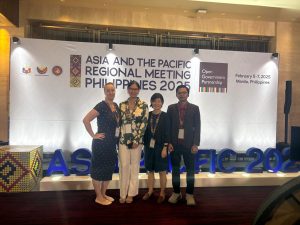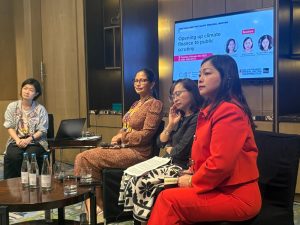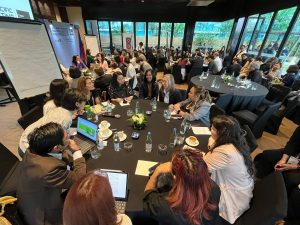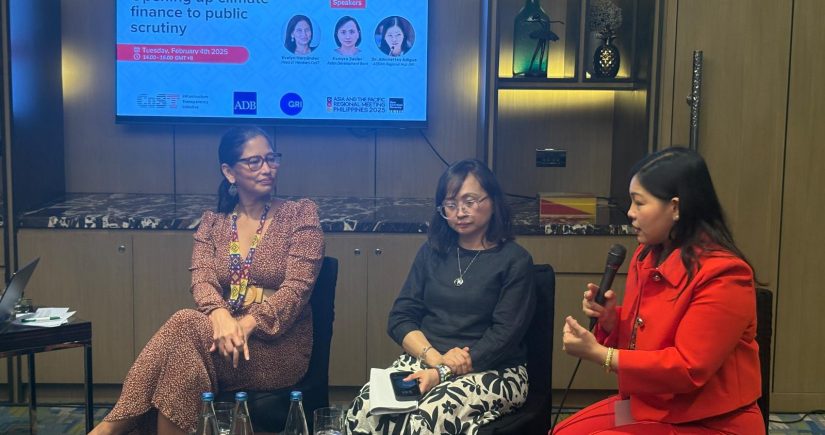By: Justine Wharton
The 2025 Open Government Partnership (OGP) Asia and the Pacific Regional Meeting was held in Manila, Philippines in February 2025.
Justine Wharton, Head of Advocacy and Communications at CoST, presents her list of her personal top 5 sessions from the week-long event.
Open Plenary:
The formal meeting began with Open Government Partnership’s (OGP) incoming Chair Aidan Eyakuze who called for a bold course for open government for the region with a need for “stronger regional collaboration” and the importance of Multi-Stakeholder Groups (MSGs) as a “cornerstone” to achieve this.
This was followed by Hon. Amenah F. Pangandaman, Secretary, Department of Budget Management who set out the Cabinet’s commitment to mainstreaming principles of OGP – transparency, accountability, and participation – in the Philippines.
Demonstrated through the new Government Procurement Act and its Implementing Rules and Regulations…not to forget the entire Cabinet being in attendance for the Regional Meeting!

Opening Up Climate Finance to Public Scrutiny:
This side event was hosted by us, CoST – Infrastructure Transparency Initiative, with Evelyn Hernandez our very own Head of Members, Esmyra Javier from the Asian Development Bank (ADB), and Dr Allinnettes Adigue at the ASEAN Regional Hub, Global Reporting Initiative (GRI).
$300 billion of climate finance is expected to flow from developed to developing countries by 2035 in a landscape where the International Monetary Fund estimated average losses of 30% of public investment due to inefficiencies, corruption, and mismanagement. Therefore, panellists shared what their organisation is doing to help ensure that the money spent on climate mitigation and adaption is spent effectively and efficiency.
Both CoST and GRI’s standards are founded on essential principles of transparency, accountability, and participation. The GRI Standards enable any organization – large or small, private or public – to understand and report on their impacts on the economy, environment, and people to increase transparency on their contribution to sustainable development. Esmyra Javier from the Asian Development Bank (ADB) highlighted that sustainability is at the core of ADB’s activities and shared that they have been utilising GRI Standards to report their sustainability impact since 2007, as well as collaborating with other Multilateral Development Banks to amplify their climate financing strategies and publish their joint efforts in the annual Joint MDB Climate Finance Report.
Open Contracting for Infrastructure Data Standard (OC4IDS), a data standard developed collaboratively by CoST and the Open Contracting Partnership including a recent inclusion on climate finance, in collaboration with GIZ, ensures that key information about all types of infrastructure projects is open and accessible.
The beauty of CoST data standards is also that they were developed from the ground up; taking governments’ needs and turning these into a set of technical standards to help measure legitimacy and impact of quality decision making around infrastructure.
Governments are CoST members along with their local partners and engage with a multi-stakeholder group to drive the work, with the CoST International Secretariat providing free tools and support. If you would like to find out more how we can support you, you can visit our website or contact us at CoST@infrastructuretransparency.org.

Building Climate Resilient Futures in the Philippines:
“We do it not only for our generation but those yet to be born – but who are sure to come” – Climate Change Commission.
It was encouraging to hear throughout the entire four days of the Open Government Partnership (OGP) Asia & the Pacific Regional Meeting how climate finance was a repeating theme with the host nation making it clear this was a top priority of theirs. This session jointly organised by Institute for Climate & Sustainable Cities (ICSC) and Philippine Department of Energy brought together a panel of national and local politicians, government officials and civil society leaders across the Philippines to discuss how Philippines integrates climate adaption and mitigation into its development plans whilst ensuring social and economic equity. The passion and commitment in the room for making the Philippines better was palpable.
They were clear they were talking about sustainable development but with a climate deadline and a clear case was made for local participation – with this also being an essential pillar also of the CoST approach to infrastructure transparency.
Rising to the Challenge: The Road Ahead for Open Government in the Philippines:
This was another event which I am delighted to say had an impactful CoST presence. The CoST – Infrastructure Transparency Initiative – was represented by Evelyn Hernandez, the International Secretariat’s Head of Members. Evelyn spoke about the importance of Philippines placing an emphasis on the early stages of procurement and how CoST standards, tools and resources can help with this. She explained her hope that the Philippines will take inspiration from the evidence of success this approach has had with members in the region already, for example in Thailand where the Industry of Finance reported savings of 11.5 billion THB from following the CoST approach in contracts of high value.
Interoperability & Data Use:

At the breakout session which was co-organised by CoST, OGP, Open Contracting Partnership and Open Ownership, case studies were shared across Asia-Pacific on how data availability, quality, and accessibility affect data use and interoperability.
CoST Asia Regional Adviser, Clara Feng, and CoST West Lombok Manager, Imam Arief Putrajaya, shared how the Open Contracting for Infrastructure Data Standard (OC4IDS), a data standard developed collaboratively by CoST and the Open Contracting Partnership, has been utilised at West Lombok to track the development of public roads.
The INTRAS data disclosure platform had functions for geolocation tagging of infrastructure projects and provide real-time updates of project progress. The interoperability of OC4IDS allowed the development of a customised dashboard that allows civil servants to track work progress and budget utilisation of infrastructure projects. INTRAS is an example of how CoST tools have been developed in an open sourced and free-to-use manner, and the documentation on the tools can be found on Github.
That’s a wrap:
That concludes the CoST team’s roundup of the 2025 OGP Asia and the Pacific Regional Meeting. Be sure to sign up for our newsletter to receive more articles like this by emailing us at: CoST@infrastructuretransparency.org, visit us for more information on our tools and standards at https://infrastructuretransparency.org/joining-cost/ and follow us on Linkedin.
You can watch our Climate Finance event here:
Paalam!
 Justine Wharton joined CoST as our Head of Advocacy & Communications in January 2025. She brings a wealth of senior leadership experience across communications, strategic partnerships, advocacy, politics and strategy from her work as a Senior Civil Servant for the UK government and a UK regulator. She has previously held Board member positions in the not-for-profit sector and is a qualified leadership coach and has a passion for supporting women of colour and those from lower socio-economic backgrounds in their career development.
Justine Wharton joined CoST as our Head of Advocacy & Communications in January 2025. She brings a wealth of senior leadership experience across communications, strategic partnerships, advocacy, politics and strategy from her work as a Senior Civil Servant for the UK government and a UK regulator. She has previously held Board member positions in the not-for-profit sector and is a qualified leadership coach and has a passion for supporting women of colour and those from lower socio-economic backgrounds in their career development.
